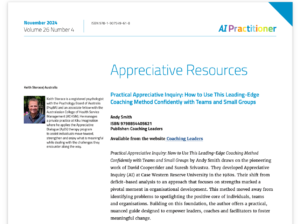Questions for the Delivery (or ‘Destiny’) Stage

[ad_1]

Note: I hope you’ll find these questions useful, whatever kind of coaching you’re doing – even if Appreciative Inquiry isn’t part of your preferred repertoire yet.
Also, apologies that this newsletter hasn’t appeared for a month or so. I’ve had my head down working on the audiobook version of the Practical Appreciative Inquiry book, which should be released soon. By the way, check out this glowing review of the book from Appreciative Inquiry Practitioner magazine!
In this final stage of the coaching session, the client chooses which action(s) they will take to move towards their Dream vision of the future, from the options they came up with in the Design stage.
In a formal coaching session, or if you are using a coaching approach to formulate a personal development plan in an appraisal, the output from this stage can be a detailed action plan.
In informal coaching, where a friend or colleague has asked you to help them solve a problem or make a difficult decision, just one small step may be all that is needed. Small actions add up!
In either case (or at any point on the spectrum between formal, contracted executive coaching and an informal chat), it’s the client who decides what actions they will take – not the coach.
Where you are helping them draw up an action plan, you need to take particular care that you are not “coaching for compliance”, pushing them to make commitments before they’re ready, just to have a list of actions as the output of the coaching session.
You’re looking for congruence, which the client’s body language and voice tone will give clues to, about their decisions. If we were to step outside of our normal practice and ask a closed question “Are you ready to do this?”, we’d be looking for the equivalent of “Hell yeah!”
Initial Questions
- “What would you like to do personally, straight away?” It doesn’t always happen, but when your coaching client feels some action is so right that it’s almost leaping out at them from their list of options, that’s a great place to start.
- “What are your next steps?” A more general question. Allow the client enough time to make their choices, rather than pressing them to a premature decision.
- “By when?” For each action chosen, this is an obvious follow-up question that helps the client order and prioritise their action steps.
- “Who else do you need to involve?” Many worthwhile actions just aren’t achievable by the actions of one person alone, so it’s worth asking your client who they need to get help, support, mentoring, or advice from.
- “What’s most likely to succeed?” Another question you can ask to make it easier to pick out the best options.
Overcoming Inertia
Despite the exhortations of motivational gurus to “take massive action!” to achieve goals, sustainable change usually happens in small steps. The hardest thing about achieving goals is usually getting started. Once the ball is rolling, the chosen course of action develops a momentum of its own, starts to generate its own motivation, and can quickly develop into a habit, and even become part of our identity. Motivation follows action more reliably than the other way round.
Often this is because the client is thinking in terms of large or complicated actions where the time and trouble involved in carrying them out successully seems daunting.
To help overcome this inertia, and to avoid ‘over commitment’ and the motivation loss that follows it, you can ask the client to break the actions down into smaller steps that seem achievable.
You could also recycle this question that I previously suggested for option generation in the Design stage, used here to help make the first step to get things moving so small and easy that doing it feels like less effort than not doing it: “What’s the smallest thing you can do to move towards your outcome?”
Next: how to help the client evaluate their chosen options – but in a non-directive way.
If you want to learn the practical how-tos of using Appreciative Inquiry with teams and small groups (with plenty of tips to scale up to larger-scale and longer-term change), join the Practical Appreciative Inquiry facilitator training starting soon!
[ad_2]




